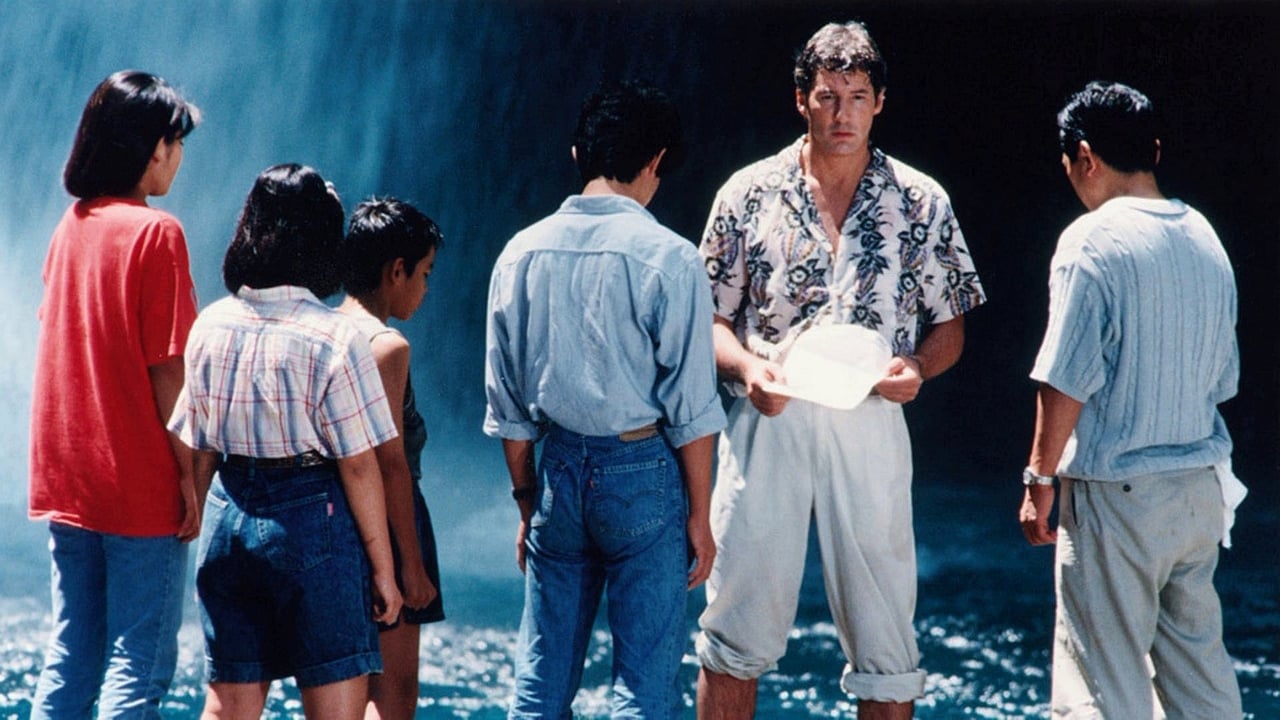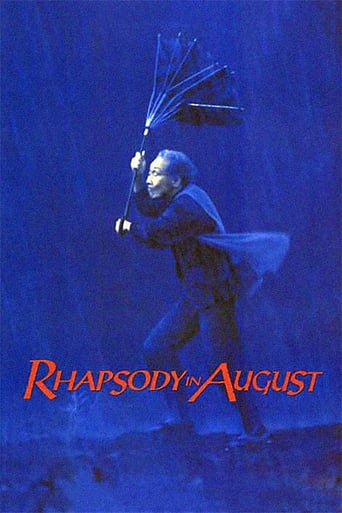Chirphymium
It's entirely possible that sending the audience out feeling lousy was intentional
Seraherrera
The movie is wonderful and true, an act of love in all its contradictions and complexity
filippaberry84
I think this is a new genre that they're all sort of working their way through it and haven't got all the kinks worked out yet but it's a genre that works for me.
TY Tan
As an admirer of Kurosawa, I have been warned by many on the political slant of the film. I do not blame Kurosawa for having made "The Most Beautiful" (1944) as it was probably a film which he was forced to make, but with "Rhapsody" made 45 years after the war ; his view of things in nothing short of being fascist. Japan was the aggressor. When Italy and Germany fell, they still believed they could win the war on the Asian front. If not for the bombs, how many more non Japanese nationals would have lost their lives or endured torture? They invaded. They caused such atrocities which human history had never before recorded. The Japanese militia was trained to commit suicide rather than surrender. If not for the H-Bombs, Japan will never have surrendered. The H-bombs were a necessity of the time. Why should an American feel embarrassed and apologise to the Japanese for Hiroshima and Nagazaki? It is the Japanese who should say no more to Japanese imperialism and apologises to the entire world for having invaded plundered raped mutilated and caused such suffering to the entire human race living in the east at the time. It is the Japanese who should say they have learned their lesson. After this I doubt if I will be able to see "the humanism" of Kurosawa in "Red Beard" in the same light. For those who think America wrong in 1945, well maybe it is high time they finance a film made by Jews apologising to the Germans for the concentration camps of WWII.
trochesset
The casting and dressing of the children. Not only are all of them horrible little actors, but their constumes are hideous, and the writing for them makes me cringe. If they weren't the main characters and the ones carrying the story along, then I may be able to overlook these flaws, but these are no minor flaws.The best parts of the film involve the grandma, be it her at the temple, her during the lightning storm at the house, or her running off in the rain, these were all well acted, all well shot, but not enough to save this production.Of the 19 Kurosawa films I have seen, this is easily the worst.3/10
MartinHafer
This story is about the grandkids who come to stay with their elderly grandmother while their families go on vacation. At first, the kids are pretty bored living out in the country, but over time they grow to appreciate the simplicity as well as the chance to spend quality time with grandma. Slowly, she begins to talk to them about the past. It seems that their parents have never really told them about this--in particular, how grandma had survived a nuclear attack but had lost most of those she held dear. Unfortunately, while this is slowly revealed, at the same time, grandma's mind begins to wane and she ultimately degenerates into senility and despair. Later, the parents and Richard Gere of all people return and they talk about the past--until Gere finds out that his Japanese father died and he is wanted back home to make arrangements. A very odd film but interesting because it deals with the long-term impact of war.
bidochon
When I saw this movie, I remembered Louis-Ferdinand Celine's book, "Journey to the End of the Night", a anti-war book. Reading reviews about the movie, listening to what people in the US had to say, seeing the reaction of the American media to this movie, I was sad, simply sad. This movie is not about Japan, it's not about America, it could have been anywhere a war had happened.This movie is a poem against war and the scars it leaves forever deep in the mind of the people who suffered those wars. Those who didn't suffer a war are lucky, and shouldn't be blamed for being this lucky, but they should see movies like this to understand what war is about. The world is never better after war. The first ones to agree to settle things through warfare are the ones who didn't suffer war. There are no winners in a war, just remember.I'm sorry that all those who felt attacked in their pride as Americans are missing the point of this movie. If your father or your grandfather, or your friend has been to war, just listen to them.The performance of the grandmother will make you forget you're watching a movie! It is filmed simply and un-pretentiously, though is a very emotional film.Enjoy.PS: Oh and I'm not Japanese...

